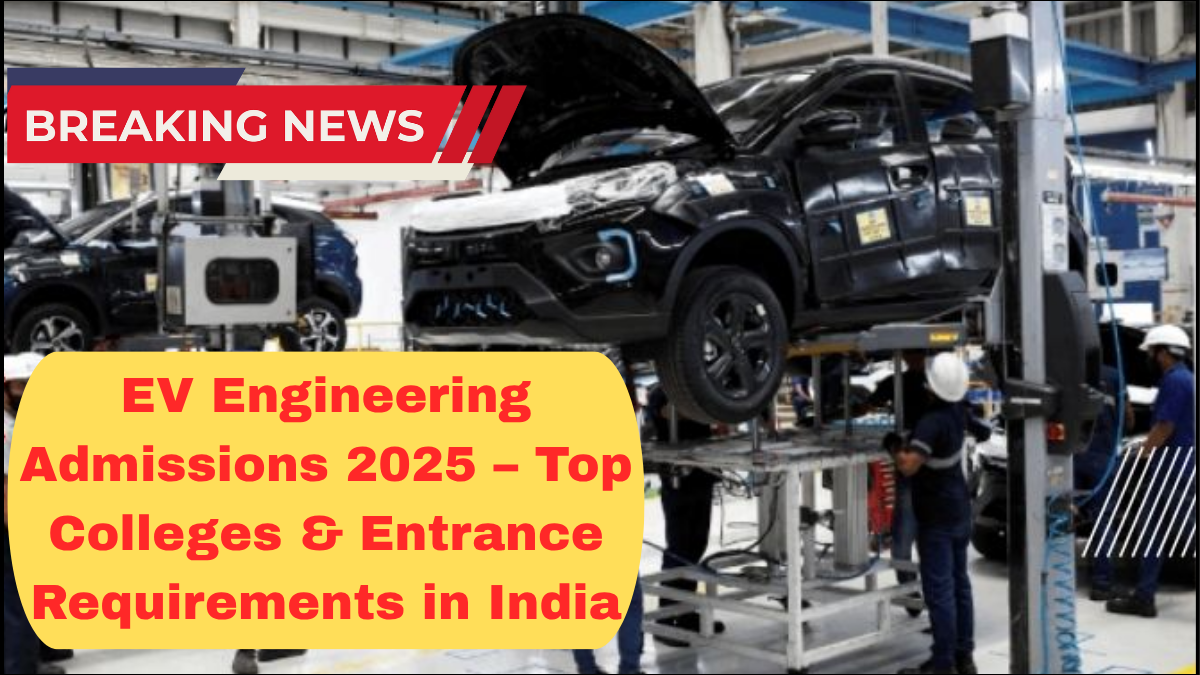As India accelerates its transition towards a sustainable mobility future, Electric Vehicle (EV) engineering is emerging as one of the most in-demand fields in both academia and industry. The EV sector is no longer a niche—it’s a necessity. With the government pushing policies like FAME II and automotive companies investing heavily in electric mobility, skilled EV engineers are becoming essential.
If you’re planning to pursue a career in this cutting-edge sector, 2025 is a crucial year. This guide will walk you through the EV engineering entrance process, top colleges offering electric vehicle-focused BTech programs, and everything you need to know to get started.

What is EV Engineering?
EV engineering is a multidisciplinary field that blends electrical engineering, mechanical systems, power electronics, battery technologies, embedded systems, and software development. The goal? Designing, developing, and maintaining electric mobility solutions—from electric cars and scooters to charging infrastructure and battery management systems.
This makes EV engineering a dynamic career choice for tech-savvy students passionate about innovation, sustainability, and real-world problem-solving.
Top Electric Vehicle BTech Colleges in India
Here are some of the leading institutions offering specialized programs in electric vehicle engineering or BTech programs with strong EV modules:
1. IIT Madras – Dual Degree in EV Technology
-
Program Type: Interdisciplinary Dual Degree (IDD)
-
Eligibility: JEE Advanced + BTech in Electrical, Mechanical, or related fields
-
Highlights: In-depth curriculum covering batteries, drive trains, and intelligent systems.
2. IIIT Hyderabad – Specialization in Smart Mobility
-
Program Type: BTech with specialization
-
Eligibility: JEE Main
-
Highlights: Focus on embedded systems, autonomous EVs, and mobility software.
3. Amrita Vishwa Vidyapeetham – BTech in EV Technology
-
Program Type: Full-time undergraduate
-
Eligibility: AEEE or JEE Main
-
Highlights: Industry-linked modules, hands-on labs, and real-world EV projects.
4. Vellore Institute of Technology (VIT) – BTech in Electrical and Electronics with EV Specialization
-
Eligibility: VITEEE
-
Highlights: Updated curriculum including powertrain simulation, battery management, and motor control.
5. UPES Dehradun – BTech in EV Engineering
-
Eligibility: UPESEAT / JEE Main
-
Highlights: Industry-integrated training, including internships with EV startups and manufacturers.
EV Engineering Entrance Requirements 2025
Admissions into EV engineering programs are mostly entrance-based. Below are the key entrance exams and requirements:
1. JEE Main & JEE Advanced
-
Most premier institutes (IITs, NITs, IIITs) require scores from these exams.
-
A solid background in Physics, Chemistry, and Mathematics at the Class 12 level is mandatory.
-
High rank in JEE Advanced opens doors to dual-degree programs focusing on EV tech.
2. Private University Exams
-
Institutes like VIT, SRM, and UPES conduct their own entrance tests (e.g., VITEEE, SRMJEEE, UPESEAT).
-
These tests evaluate PCM knowledge and aptitude for engineering.
3. State-level Entrance Exams
-
Some state universities accept scores from CET (Karnataka), MHT-CET (Maharashtra), or EAMCET (Telangana/AP) for EV-related programs.
4. Direct Admission with JEE Main Score
-
Several private colleges offer direct admissions based on JEE Main rank, without separate entrance tests.
Curriculum & Skills You’ll Learn
A well-designed electric vehicle BTech college program will typically include:
-
Battery Systems: Chemistry, packaging, and thermal management
-
Motor Drives & Controllers: BLDC motors, inverters, and regenerative braking
-
Power Electronics: Converters, inverters, and charging circuits
-
Vehicle Dynamics: Suspension, braking systems, and weight distribution
-
Autonomous Systems & IoT: Sensors, ECUs, and smart communication
-
EV Safety & Regulations: ISO standards, cybersecurity, and EMI/EMC protocols
Hands-on experience with simulation tools like MATLAB, ANSYS, and SolidWorks is also part of the training.
Career Prospects After EV Engineering
Graduates from electric vehicle BTech colleges are finding roles in:
-
EV startups (Ather, Ola Electric, Bounce Infinity)
-
Automotive giants (Tata Motors, Mahindra Electric, Hyundai)
-
Battery manufacturing and R&D companies
-
Charging infrastructure providers (Tata Power, Statiq, etc.)
-
Government agencies focused on transport and renewable energy
Average starting packages range between ₹6-12 LPA, with international placements also rising for top-tier graduates.
FAQs – EV Engineering Admissions 2025
Q1. Is EV engineering a separate course or a specialization?
EV engineering can be both. Some colleges offer a full-fledged BTech in EV Engineering, while others provide it as a specialization under Electrical, Mechanical, or Mechatronics programs.
Q2. What subjects should I focus on in Class 12 to prepare for EV engineering entrance?
Physics, Chemistry, and Mathematics are essential. Computer Science is also helpful for control systems and software modules.
Q3. Is coding required in EV engineering?
Yes. Programming (especially in C, Python, or MATLAB) is important for embedded systems, simulations, and automation in EVs.
Q4. What’s the future of EV engineering in India?
It’s rapidly growing. With strong government backing, expanding infrastructure, and rising consumer demand, the EV sector is expected to generate over 10 lakh jobs by 2030.
Q5. Which is better: traditional Electrical Engineering or BTech in EV Engineering?
If your focus is specifically on EVs, a dedicated EV Engineering course gives more targeted knowledge and faster industry entry. However, a traditional EEE degree offers broader career flexibility.
click here to learn more